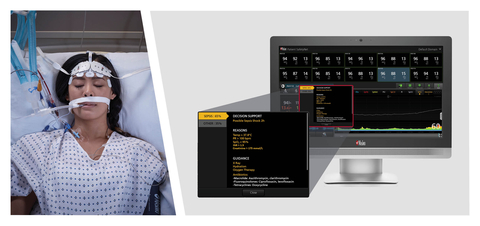NEUCHATEL, Switzerland– Masimo today announced the limited market release of Sepsis Index (Si™), an early warning indicator designed to help clinicians identify possible sepsis in patients remotely monitored with Masimo Patient SafetyNet™. Patient SafetyNet, a powerful remote patient monitoring and surveillance system in use around the world, aggregates real-time physiological data from Masimo and third-party bedside monitoring equipment for display at central stations, allowing clinicians to monitor patient condition from afar. By continuously analyzing a variety of vital signs data and other clinical measurements together with EMR data captured by Patient SafetyNet, Si works by quantifying patient status in an easily interpretable sepsis risk score.
Sepsis Index, using the aggregated data from Patient SafetyNet, is designed to provide early warning of possible sepsis or other causes of deterioration in a patient’s condition, and to help track patient status following sepsis diagnosis and monitor the effectiveness of treatment and interventions. In addition, Si is designed to display on-screen decision support and recommended actions that each institution can update according to its sepsis policy. The Si algorithm is customizable and draws upon Masimo’s expertise in developing a variety of advanced early warning risk-scoring solutions, such as Halo and Halo ION®, since 2009.
Sepsis, a life-threatening condition in which organs malfunction because of widespread infection, is not only common among hospital patients and is a common cause of death.1 The CDC estimates that every year, about 1.7 million adults in the U.S. develop sepsis, of whom at least 350,000 die during their hospitalization or in hospice. One in every three patients who dies in a U.S. hospital had sepsis during their hospitalization.2 Sepsis has also been described as the most expensive condition to treat in the entire U.S. healthcare system, with an estimated $24 billion in annual costs.3 Early detection of sepsis has been associated with decreased mortality.4 Masimo Si is designed to help clinicians detect physiologic deterioration associated with the onset of sepsis and track the progress of the patient’s condition during its duration.
Aldo Carmona, MD, Senior Vice President of Clinical Innovation and Chairman of the Department of Anesthesia and Critical Care at St. Luke’s University Health Network, said, “Although there have been great advancements both clinically and technically, assessment and early identification of sepsis remain an elusive challenge. Masimo’s new indicator, Si, provides a continuous and real-time assessment of sepsis risk for a given patient based on the clinical measurements available from monitors and other EMR data (labs, medications, etc.). This could be a great addition in a hospital’s fight against the leading cause of in-patient mortality. By alerting the clinical staff to the risk of potential sepsis, it would allow for more timely intervention with life-saving resuscitation and medication. Likewise, tracking the patient state will help assess the effects of treatment and interventions so that we can improve appropriate allocation of hospital resources to patients and potentially identify patients who need escalation of treatment earlier.”
Joe Kiani, Founder and CEO of Masimo, “Masimo has always sought to solve those ‘unsolvable’ problems that need resolution. Detection of sepsis has long been one of the unsolved clinical problems, and one which we have spent considerable time and effort to remedy. With Sepsis Index, we hope to help doctors and nurses everywhere identify sepsis before it’s too late to treat it.”
Sepsis Index (Si) is not FDA cleared.


